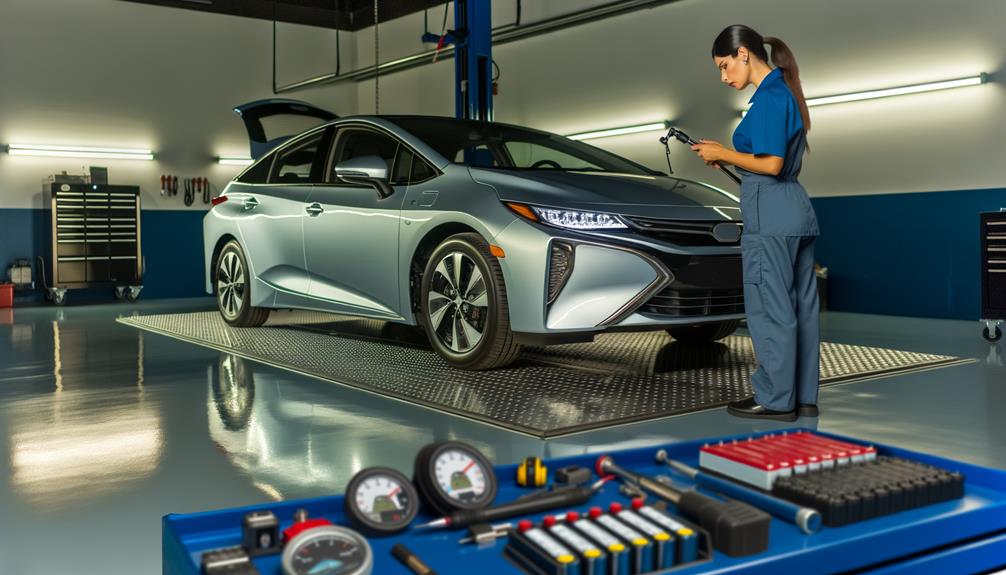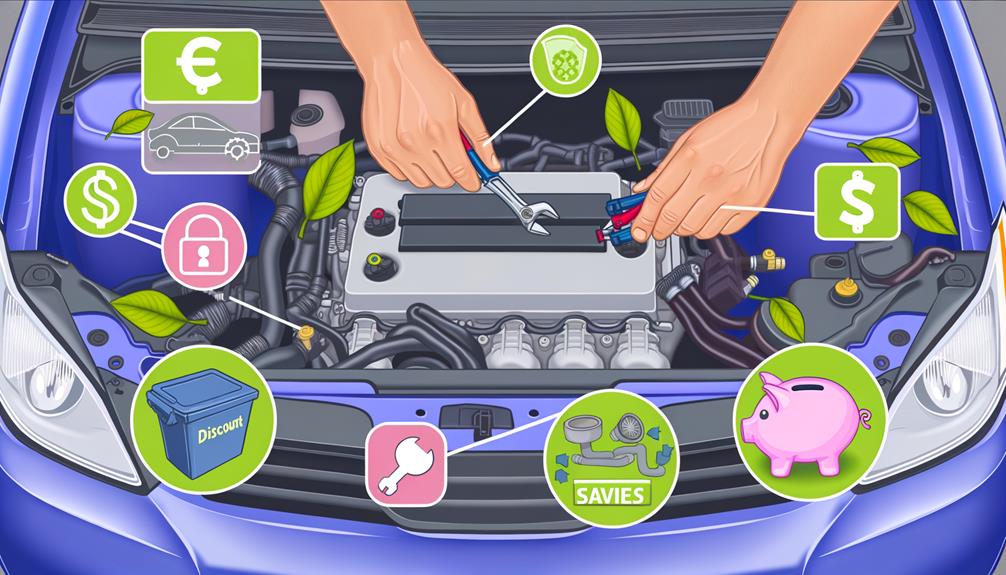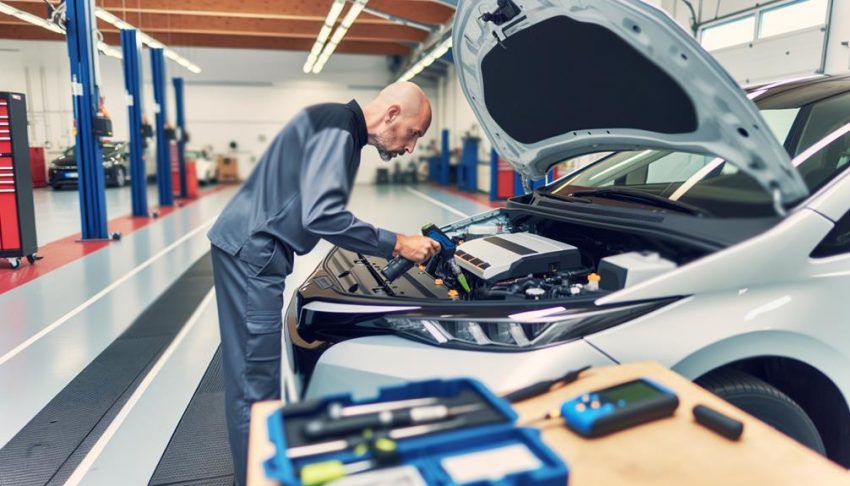You're probably wondering just how much it costs to replace a hybrid car battery. The answer isn't straightforward, as it can range from $2,000 to $8,000 depending on a number of factors. The make and model of your vehicle, the size of the battery, and the type of battery chemistry all play roles in determining the final cost. Plus, don't forget about labor charges and potential additional expenses like inverter coolant and diagnostic fees. But what exactly drives these costs, and are there ways to save? Let's explore further.
Contents
Hybrid Battery Replacement Cost
Replacing a hybrid car battery can set you back quite a bit, with costs ranging considerably depending on various factors. On average, hybrid battery replacement costs between $2,000 and $8,000. For most common models, you'll find the battery pack alone generally costs under $3,000. However, the make and model of your vehicle play a significant role in determining the overall expense. Luxury models, for example, typically incur higher costs due to more sophisticated battery technology.
Labor charges for installing a new hybrid battery are another vital aspect to take into account. These costs typically range from $500 to $1,500, and the installation process can often take more than one day. Given the high-voltage nature of hybrid batteries, it's strongly recommended to have certified mechanics handle the installation to guarantee safety and proper handling of the battery components.
Additional expenses can add up quickly. You might need to budget for inverter coolant, clips, connectors, and diagnostic fees. These additional costs can vary based on your specific vehicle and the repair shop you choose. Diagnostic fees, for instance, are important for accurately identifying any issues with the existing battery and making sure the new battery is installed correctly.
Factors such as battery size and battery chemistry further influence the total replacement cost. Larger batteries and those with advanced chemistries, often found in luxury models, tend to be more expensive. When evaluating a hybrid battery replacement, it's vital to factor in all these variables to get an accurate estimate of the total costs involved.
Frequency of Battery Replacement
Although hybrid batteries are designed for longevity, understanding the frequency of battery replacement is vital for maintaining your vehicle's performance. Typically, hybrid batteries last between 8 to 15 years, with a general mileage range of 100,000 to 150,000 miles before you need to replace them. This lifespan guarantees that many hybrid owners can enjoy years of reliable service from their battery.
For Honda hybrid vehicles, you benefit from an 8-year/100,000-mile warranty on the battery. This warranty provides considerable peace of mind and covers a substantial portion of the battery's expected life. It's important to recognize that the frequency of battery replacement is generally low when proper care and maintenance are observed. Regular servicing and maintenance can greatly extend the life of your hybrid battery, reducing the likelihood of premature replacement.
A key indicator that you need to replace your hybrid battery is a noticeable deterioration in the vehicle's electric mode range. When you observe a considerable drop in the distance your car can travel on electric power alone, it often signals a loss of battery capacity. Monitoring your vehicle's performance closely and addressing any issues promptly can prevent unexpected battery failures.
Honda Universe Battery Services

Honda Universe Battery Services offer an extensive range of solutions for maintaining and replacing hybrid car batteries. If you're driving a hybrid vehicle and need to replace a hybrid battery, Honda Universe in Lakewood is an ideal choice. They provide various coupons and discounts specifically tailored for hybrid battery replacement services, making it more affordable for you.
One of the standout features of Honda Universe is their commitment to using Original Equipment Manufacturer (OEM) parts and accessories. This guarantees that the quality of the battery replacement is exceptional, maintaining the performance and longevity of your hybrid vehicle. Using OEM parts is vital because they meet the exact specifications and standards set by the vehicle manufacturer, which generic parts often do not.
Scheduling an appointment for battery replacement at Honda Universe is straightforward and convenient. You can easily set up a service visit that fits into your schedule, minimizing any disruption to your day. This ease of access is a significant benefit, especially when dealing with something as essential as a hybrid battery.
Located in Lakewood, Honda Universe is readily accessible for anyone in the region seeking reliable hybrid battery replacement and maintenance services. Their all-encompassing resource offerings focus on maximizing your vehicle's performance, helping to extend the life of your hybrid battery. They provide detailed information and guidance to help you understand how to best care for your hybrid vehicle, guaranteeing that you get the most out of your investment.
Costs Breakdown
Understanding the costs associated with replacing a hybrid car battery is imperative for any hybrid vehicle owner. The average cost to replace a hybrid battery typically ranges from $2,000 to $8,000. For most common models, you'll find that replacement costs usually fall under $3,000.
When breaking down these costs, the battery pack itself is a major component, with prices varying from $1,000 to $6,000 depending on the battery size and type. It's important to recognize that luxury models often incur higher costs due to larger battery sizes and more complex systems.
Labor installation fees are another important element in the overall replacement costs. These fees generally range from $500 to $1,500. The installation process is intricate, requiring specialized knowledge and tools, which contributes to the higher labor costs.
Beyond the battery pack and labor fees, there are additional expenses to take into account. Costs for inverter coolant, clips/connectors, and diagnostic fees can add to the total replacement cost. These ancillary costs might seem minor, but they can increase the overall expenditure greatly, especially if multiple components need replacement.
Furthermore, the make and model of your vehicle play a considerable role in replacement costs. Luxury hybrid vehicles often come with higher fees due to more sophisticated battery management systems and larger battery sizes.
Lastly, market demand for materials used in lithium-ion batteries can cause fluctuations in replacement costs. As the demand for these materials rises or falls, so too can the cost of the battery itself. Therefore, understanding battery chemistry and market trends is essential for accurately estimating replacement costs.
Factors Influencing Replacement Cost

Several critical factors influence the cost of replacing a hybrid car battery, making it essential to understand each element's role. One of the primary factors is the make and model of your vehicle. Luxury brands often have higher replacement costs compared to mainstream models due to the complexity and exclusivity of their hybrid systems. For instance, replacing a battery in a Lexus hybrid might be more expensive than in a Toyota Prius.
Battery size is another significant factor. Smaller batteries, like the 1.3 kWh unit in a 2012 Toyota Prius, generally cost less to replace than larger ones, such as the 17 kWh battery found in a 2018 Honda Accord. The larger the battery, the higher the material and manufacturing costs, which directly impacts the replacement price.
The chemistry of the battery also plays a critical role in determining cost. Nickel-metal hydride (NiMH) batteries are usually less expensive than lithium-ion (Li-ion) batteries. Li-ion batteries are more efficient and have higher energy density, but they come with a higher price tag due to the costly materials required for their production.
Market demand for the materials used in Li-ion batteries can further influence replacement costs. Periods of increased demand for lithium and cobalt can drive prices up, making replacements more expensive.
Labor costs for installation range from $500 to $1,500, depending on the complexity of the job and the location of the repair shop. Urban areas with higher labor rates will naturally incur higher costs. Additionally, the specific services required, such as diagnostics and system recalibration, can add to the overall expense. Understanding these factors can help you better anticipate the costs associated with replacing your hybrid car battery.
Signs You Need a New Battery
You should pay close attention to a noticeable drop in fuel economy, as it often indicates inefficiencies in your hybrid system. If your gas engine doesn't shut off during electric mode, it could signal a failing battery. Regularly monitor your EV mode range and watch for persistent dashboard warnings to catch early signs of battery capacity loss.
Deteriorating EV Mode Range
When you notice a significant drop in your hybrid vehicle's EV mode range, it often signals the hybrid battery is losing capacity and may need replacement. A deteriorating EV mode range means you can travel fewer miles on electric power alone, indicating reduced battery performance. This decline is one of the earliest signs that your hybrid battery could be failing.
For instance, if your vehicle previously allowed you to travel 20 miles on electric power but now only manages 10 miles, it's a clear indicator of battery deterioration. Additionally, if the gas engine fails to shut off while you're in electric mode, it suggests inefficiency in the hybrid system and potential battery failure. This is because the battery can't sustain electric-only mode as efficiently as it once did.
Regular monitoring of your hybrid vehicle's performance is vital. Pay close attention to the EV mode range; any significant reduction should prompt you to contemplate that the hybrid battery might need to be replaced. By addressing this issue early, you can guarantee that your hybrid vehicle continues to perform efficiently and reliably.
Decreased Fuel Economy
A noticeable drop in fuel economy, often by 20% or more, is a strong indicator that the hybrid battery is losing capacity and might need replacement. If you find that your vehicle frequently switches to the gas engine instead of utilizing electric mode, this is a clear sign that the hybrid battery is struggling to hold a charge. Many drivers of plug-in hybrid vehicles report a decline in their electric-only range as a sign of battery deterioration, typically occurring after 100,000 to 150,000 miles.
Regularly monitoring your fuel consumption is essential. Consistent drops in miles per gallon (MPG) can suggest that the hybrid battery is nearing the end of its lifespan. This decrease in fuel economy is often linked to the battery's inability to sustain a charge, forcing the vehicle to rely more on the internal combustion engine.
In plug-in hybrid models, decreased fuel economy can become apparent when the vehicle's electric mode is less effective, requiring more frequent gasoline refills. The correlation between reduced fuel efficiency and battery health is significant, making it vital to address these signs promptly to avoid further performance issues.
Persistent Dashboard Warnings
Persistent dashboard warnings, such as the battery or check engine light, shouldn't be ignored as they can indicate potential issues with the hybrid battery that may necessitate replacement. These warning lights could be signaling a depleted battery or other malfunctioning components that need attention. Ignoring these signals can lead to more severe and costly repairs down the road.
Regular monitoring of your dashboard indicators is vital. If you observe a persistent warning light, it's important to take immediate action. A depleted battery can greatly impact your vehicle's performance and efficiency. You might also notice a considerable drop in fuel economy or a decrease in the electric mode range, both of which are indicators of battery capacity loss.
- Sudden drop in fuel economy: This can be a sign that your battery isn't holding a charge effectively.
- Decreased electric mode range: If your car's electric mode range shortens, it could mean the battery is losing its capacity.
- Persistent warning lights: Consistent dashboard alerts should prompt you to seek professional diagnosis.
Consulting a certified mechanic is advisable when these warning lights persist. They can accurately diagnose the issue and determine if a hybrid battery replacement is necessary. Don't let these small indicators turn into bigger problems.
Tips to Save on Replacement

Ever wondered how you can cut down on the costs of replacing a hybrid car battery? One effective strategy is to guarantee your vehicle undergoes proper maintenance. Regular check-ups and servicing can extend the battery life, making replacement less frequent and thus less expensive. Routine maintenance tasks, such as keeping the hybrid system clean and verifying that software updates are applied, can delay the need for a costly new battery by years.
Moreover, protecting your battery from extreme temperatures is vital. Extreme heat or cold can accelerate battery degradation, leading to premature failure. Parking in shaded areas during summer and using a garage in winter can mitigate temperature-related damage, consequently extending battery longevity and reducing replacement costs.
Another cost-saving measure is to evaluate hybrid battery reconditioning. This process can restore battery performance and extend its lifespan, potentially allowing you to avoid a full replacement. Reconditioning is generally much less expensive and can be a viable option if the battery isn't completely dead.
Additionally, always use Original Equipment Manufacturer (OEM) parts from trusted retailers. For example, Honda Universe offers OEM parts and services along with coupons and discounts, which can greatly reduce the replacement cost. Confirming that you use high-quality, certified parts can also prevent future issues, offering long-term savings.
Lastly, regularly monitor your battery's performance. Addressing minor issues early can prevent them from escalating into major problems that require complete replacement. Tools and diagnostic services can help you keep tabs on battery health, guaranteeing timely interventions that save you money in the long run.
Frequently Asked Questions
Is It Worth Replacing a Hybrid Battery?
You should consider the battery lifespan and replacement benefits. If your hybrid battery is nearing the end of its lifespan, the fuel savings and improved efficiency from a new battery can make the replacement a worthwhile investment.
How Much Does It Cost to Replace a Hybrid Car Battery?
You'll find that costs vary based on your vehicle's make and model. Replacement options range from $2,000 to $8,000. Check if a battery warranty applies, as it can greatly reduce the expense of a new installation.
How Long Do Hybrid Batteries Really Last?
Hybrid batteries typically last between 8 to 15 years, depending on battery lifespan and performance factors. Usage, maintenance, and environmental conditions like extreme temperatures can impact longevity. Regular servicing can greatly extend the battery's effective life.
How Much Does It Cost to Replace a Mild Hybrid Battery?
Replacing a mild hybrid battery typically costs between $1,000 and $3,000, plus $500 to $1,500 for labor. Mild hybrid advantages include lower costs and dealing with battery lifespan considerations, usually 8-10 years or 100,000-150,000 miles.
Conclusion
When considering hybrid battery replacement, it's crucial to understand the potential costs involved, ranging from $2,000 to $8,000. Factors like vehicle make, battery type, and labor charges greatly impact the total expense. Pay attention to signs of battery wear, and consider professional services for accurate diagnostics. By planning and budgeting for these costs, you can guarantee your hybrid vehicle remains efficient and reliable, ultimately saving on long-term maintenance.
